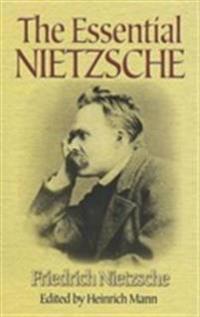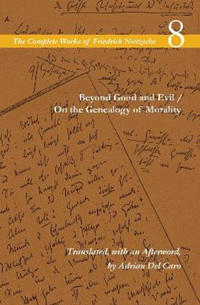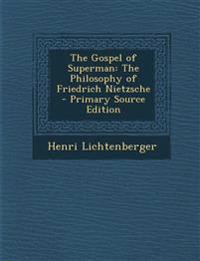Marine Lover of Friedrich Nietzsche (Övrig)
avLuce Irigaray
ISBN: 9780231070829 - UTGIVEN: 1991-03-18Published in France in 1980, Marine Lover is the first in a trilogy in which Luce Irigaray links the interrogation of the feminine in post-Hegelian philosophy with a pre-Socratic investigation of the elements. Irigaray undertakes to interrogate Nietzche, the grandfather of poststructuralist philoso[...]
Marine Lover of Friedrich Nietzsche (Häftad)
avLuce Irigaray
ISBN: 9780231070836 - UTGIVEN: 1991-04Published in France in 1980, Marine Lover is the first in a trilogy in which Luce Irigaray links the interrogation of the feminine in post-Hegelian philosophy with a pre-Socratic investigation of the elements. Irigaray undertakes to interrogate Nietzche, the grandfather of poststructuralist philoso[...]
Feminist Interpretations of Friedrich Nietzsche (Pocket)
avKelly (EDT) Oliver, Marilyn (EDT) Pearsall, Kelly (EDT) Oliver
ISBN: 9780271017648 - UTGIVEN: 1998-07Nietzsche has the reputation of being a virulent misogynist, so why are feminists interested in his philosophy? The essays in this volume provide answers to this question from a variety of feminist perspectives. The organization of the volume into two sets of essays, "Nietzsche's Use of Woman" and "[...]
Friedrich Nietzsche (Häftad)
avLee Spinks
ISBN: 9780415263603 - UTGIVEN: 200304This volume introduces the world of Friedrich Nietzsche to students of literary and cultural studies, offering a lucid account of Nietzsche's thought on: anti-humanism good and evil the Overman nihilism the Will to Power. Lee Spinks prepares readers for their first encounter with Nietzsche's mo[...]
Friedrich Nietzsche and the Politics of History
ISBN: 9780521155076 - UTGIVEN: 2011-10This book explores Friedrich Nietzsche's understanding of modern political culture and his position in the history of modern political thought. Surveying Nietzsche's entire intellectual career from his years as a student in Bonn and Leipzig during the 1860s to his genealogical project of the 1880s, [...]
Friedrich Nietzsche
ISBN: 9780521691635 - UTGIVEN: 2006-10Friedrich Nietzsche is one of the most influential thinkers of the past 150 years and On the Genealogy of Morality (1887) is his most important work on ethics and politics. A polemical contribution to moral and political theory, it offers a critique of moral values and traces the historical evolutio[...]
Friedrich Nietzsche (Inbunden)
avJulian Young
ISBN: 9780521871174 - UTGIVEN: 2010-03In this beautifully written account, Julian Young provides the most comprehensive biography available today of the life and philosophy of the nineteenth-century German philosopher Friedrich Nietzsche. Young deals with the many puzzles created by the conjunction of Nietzsche's personal history and hi[...]
Friedrich Nietzsche and the Politics of the Soul: A Study of Heroic Individualism (Pocket)
avLeslie Paul Thiele
ISBN: 9780691020617 - UTGIVEN: 1990-08-03The Complete Works of Friedrich Nietzsche (Häftad)
ISBN: 9780804734035 - UTGIVEN: 1999-03This new translation is the first to be published in a twenty-volume English-language edition of The Complete Works of Friedrich Nietzsche, the first complete, critical, and annotated translation of all of Nietzsche s work. The Stanford edition is based on the Colli-Montinari edition, which has rece[...]
Beyond Good and Evil / On the Genealogy of Morality (Häftad)
avFriedrich Nietzsche
ISBN: 9780804788984 - UTGIVEN: 2014-03Beyond Good and Evil is Nietzsche's first sustained philosophical treatment of issues important to him. Unlike the expository prose of the essayistic period (1872-76), the stylized forays and jabs of the aphoristic period (1878-82), and the lyrical-philosophical rhetoric of the Zarathustra-period (1[...]
Twilight of the Idols (Häftad)
avFriedrich Nietzsche
ISBN: 9780872203549 - UTGIVEN: 1997-05Translated by Richard Polt. Introduction by Tracy Strong.
Selected Letters of Friedrich Nietzsche (Pocket)
ISBN: 9780872203587 - UTGIVEN: 1996-12This is a reprint of the University of Chicago Press edition of 1969. This collection of over two hundred of Nietzsche's letters offers a representative body of correspondence on subjects of main concern to him - philosophy, history, morals, music and literature. Also included are letters of biograp[...]
Antichrist: Friedrich Nietzsche's Criticism of Christianity (Antichristian, Anti-Christian)
ISBN: 9781105746741 - UTGIVEN: 2013-03Save for his raucous, rhapsodical autobiography, "e;Ecce Homo,"e; "e;The Antichrist"e; is the last thing that Nietzsche ever wrote, and so it may be accepted as a statement of some of his most salient ideas in their final form. In "e;The Antichrist,"e; Nietzsche presents a hi[...]
The Making of Friedrich Nietzsche
ISBN: 9781107134867 - UTGIVEN: 2016-07How did Nietzsche the philosopher come into being? The Nietzsche known today did not develop 'naturally', through the gradual maturation of some inborn character. Instead, from an early age he engaged in a self-conscious campaign to follow his own guidance, thereby cultivating the critical capacitie[...]
The Complete Works Of Friedrich Nietzsche: Human, All-too-human (häftad)
ISBN: 9781293618370 - UTGIVEN: 2014-02The Gospel of Superman: The Philosophy of Friedrich Nietzsche - Primary Source Edition (häftad)
ISBN: 9781295754243 - UTGIVEN: 2014-02The Philosophy of Friedrich Nietzsche - Scholar's Choice Edition (häftad)
ISBN: 9781295963058 - UTGIVEN: 2015-02Selected Letters of Friedrich Nietzsche (Classic Reprint) (häftad)
ISBN: 9781440086137 - UTGIVEN: 2015-09

























